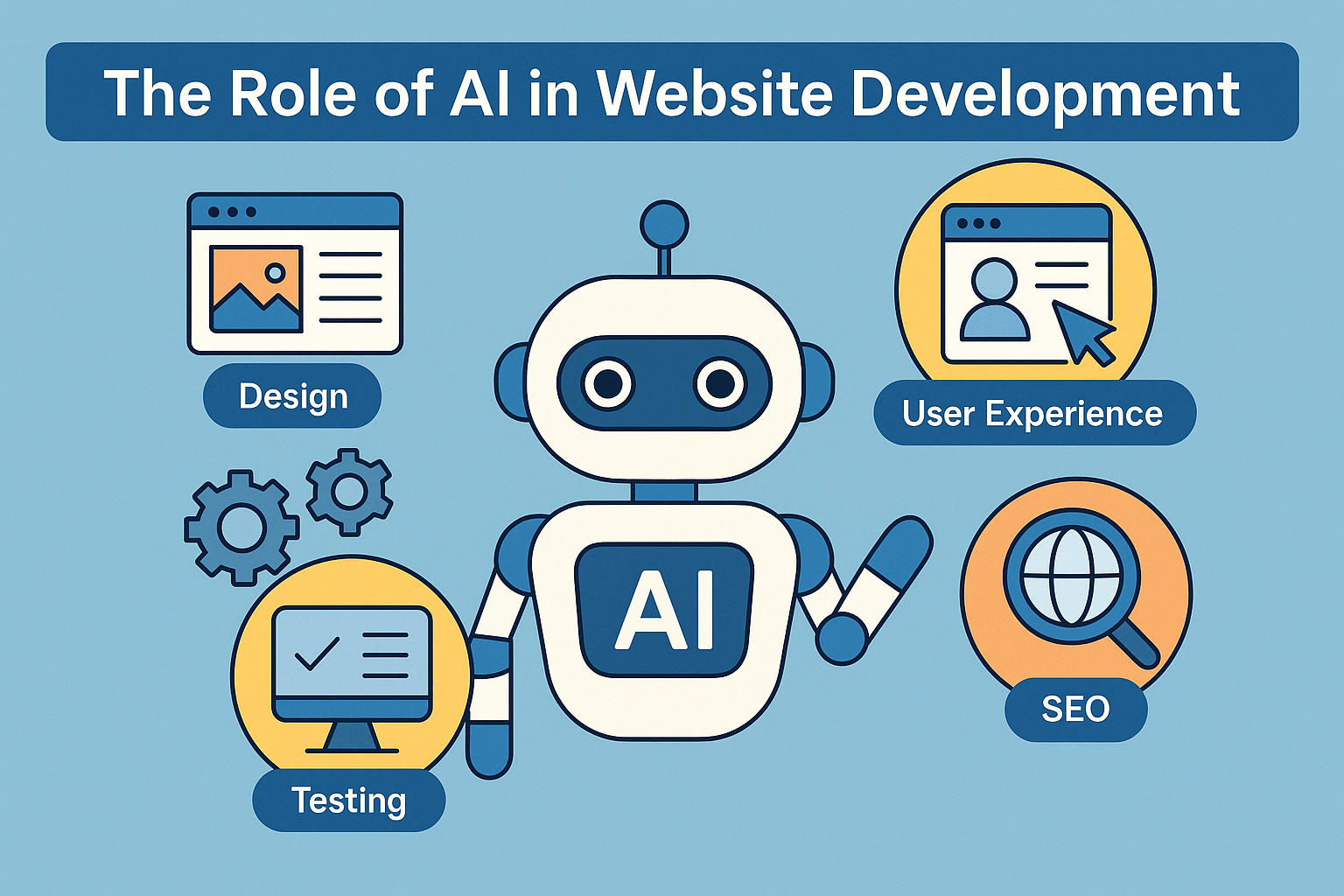In the digital age, a business’s website is its most powerful storefront. Whether it’s a startup, a personal brand, or a Fortune 500 company, the quality of a website can make or break a user’s first impression. Traditionally, website development required hours of manual coding, testing, and creative input. However, the advent of Artificial Intelligence (AI) is dramatically transforming this landscape.
AI is not just enhancing how websites are built — it’s redefining the entire web development process, from design and development to user experience and performance optimization.
1. Automated Web Design: From Idea to Interface in Minutes
One of the most noticeable contributions of AI in website development is the automation of web design. Platforms like Wix ADI (Artificial Design Intelligence) and Bookmark’s AIDA use AI to generate fully functional websites within minutes. These tools ask users a few simple questions about their business type, goals, and design preferences, then automatically generate a tailored website.
While this doesn’t completely eliminate the role of designers, it streamlines the early stages of development, allowing businesses — especially small ones — to go live faster and at a lower cost.
Key benefit: Rapid prototyping and development for users with little to no coding knowledge.
2. AI-Powered UX and UI Enhancements
User experience (UX) and user interface (UI) are crucial for website success. AI tools can analyze user behavior data to understand how visitors interact with a website. Heatmaps, click tracking, and scroll patterns help AI determine which design elements are engaging users and which are causing friction.
For example, tools like Hotjar or Crazy Egg combined with AI can suggest layout changes that improve usability and reduce bounce rates. AI also enables A/B testing automation, running multiple variants simultaneously and optimizing in real time based on performance.
Example: If users frequently abandon a form on a particular page, AI can identify the issue (e.g., form length or poor placement) and recommend changes automatically.
3. Code Generation and Smart Development
AI is also making coding smarter and more efficient. Tools like GitHub Copilot use machine learning models to auto-complete code, suggest functions, and fix bugs in real time. These AI assistants learn from millions of open-source code repositories and understand context, allowing developers to write better code faster.
Moreover, frameworks are now emerging that allow low-code or no-code website development powered by AI. This lowers the entry barrier for non-developers and helps experienced coders save time.
Result: Faster development cycles, fewer errors, and reduced reliance on repetitive tasks.
4. Personalized Website Experiences
AI is enabling a new era of personalized websites that dynamically adapt content, visuals, and recommendations based on the individual visitor. By analyzing cookies, location data, browsing history, and behavior patterns, AI can customize what a user sees in real time.
For example, an e-commerce site might show different homepage banners, product recommendations, or even navigation menus to different users — all tailored to their preferences.
Tools like: Dynamic Yield, Adobe Target, and Optimizely use AI to create these smart experiences.
Impact: Higher engagement, increased conversions, and improved customer satisfaction.
5. Chatbots and Virtual Assistants
No modern website is complete without an interactive support element, and AI-powered chatbots have become an integral part of website development. These bots are available 24/7, handling FAQs, providing product recommendations, guiding users through the site, or assisting in checkout.
Thanks to Natural Language Processing (NLP), AI chatbots are increasingly human-like, understanding tone, sentiment, and intent. They can handle complex interactions and even escalate issues to human agents when needed.
Popular tools: ChatGPT API, Drift, Tidio, and Intercom.
6. Search Engine Optimization (SEO) and Content Strategy
AI tools are also changing how websites are optimized for search engines. AI-driven SEO tools like Surfer SEO, Clearscope, and Alli AI can analyze top-performing content, identify keyword gaps, suggest internal linking strategies, and even generate optimized meta tags.
AI also helps in content creation by suggesting blog topics, headlines, and outlines based on trending data. This ensures that websites remain fresh, relevant, and discoverable.
Outcome: Improved organic rankings and increased traffic with less manual research.
7. Security and Maintenance
AI plays a crucial role in identifying security vulnerabilities and safeguarding websites against threats. AI-based systems continuously monitor for unusual behavior, unauthorized access attempts, or potential malware — reacting much faster than traditional rule-based systems.
For example, AI can flag a suspicious login or a DDoS attack in progress and initiate countermeasures instantly, minimizing downtime and protecting user data.
Additionally, AI can automate regular maintenance tasks like plugin updates, broken link fixes, and performance audits.
8. Accessibility and Inclusivity
Creating inclusive websites is no longer optional. AI helps developers analyze and enhance accessibility by checking contrast ratios, alt text, keyboard navigation, and screen reader compatibility.
AI-powered tools like accessiBe automatically scan and adjust websites to comply with global accessibility standards (e.g., WCAG), making the internet more inclusive for users with disabilities.
Conclusion: The Future is AI-Driven
AI is revolutionizing website development by making it smarter, faster, and more customer-centric. From design and code generation to user experience, SEO, and security, AI offers end-to-end support in building high-performing websites.
While AI tools may reduce the need for manual tasks, they don’t replace creativity, empathy, or strategic thinking. The most effective approach is a hybrid one — blending human creativity with AI efficiency. As the technology evolves, businesses that embrace AI in web development will stay ahead of the curve, delivering superior digital experiences that are both functional and future-ready.

